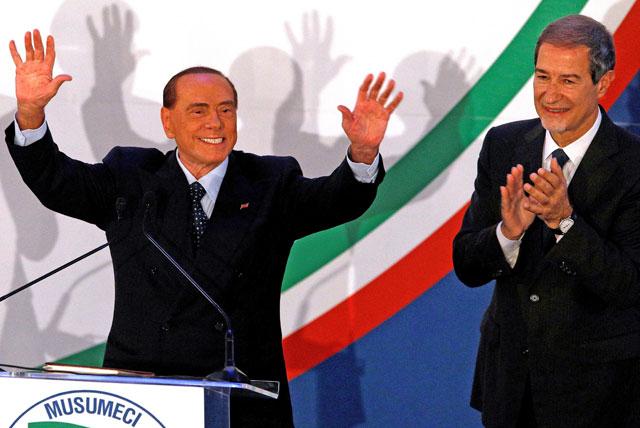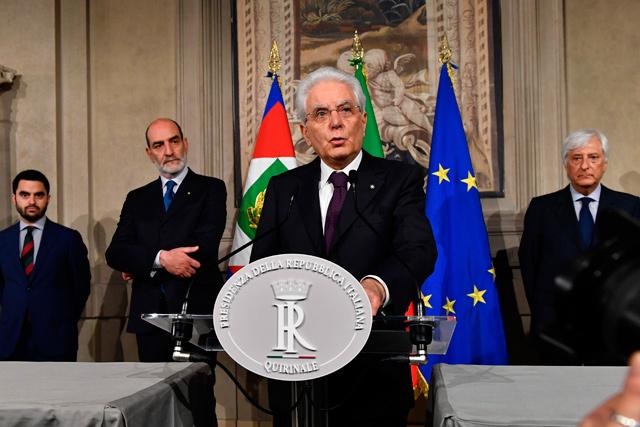You are here
Italy heads to polls with centre-right ahead but stalemate looms
By Reuters - Mar 04,2018 - Last updated at Mar 04,2018

Italian Prime Minister Paolo Gentiloni (centre) casts his vote at the polling station during the parliamentary elections in Rome, Italy, on Sunday (Anadolu photo)
ROME — Italians went to the polls on Sunday in a vote that could bring political gridlock after an election campaign marked by anger over the listless economy, high unemployment and immigration.
Pollsters have predicted that former prime minister Silvio Berlusconi’s centre-right party and his far-right allies will emerge as the largest bloc in parliament, but fall short of a majority.
The anti-establishment 5-Star Movement looks set to be the biggest single party, feeding off discontent over entrenched corruption and growing poverty, while the ruling centre-left Democratic Party is seen limping home in third place.
Heavily indebted Italy is the third-largest economy in the 19-member eurozone and, though investors have been sanguine ahead of the ballot, prolonged political stalemate could reawaken the threat of market instability.
“I’d like to see the parties work together more for the good of the country... there was too much mud-slinging during the campaign,” said 20-year-old Luca Hammad while leaving a polling station in Rome.
“I hope these elections bring change for young people. Even if you find a job, wages are so low that it is hardly worth working.”
In the latest sign of the divisive climate ahead of the vote, some homes in Pavia, near Milan, were marked overnight with stickers that said “Here lives an anti-fascist”.
Neo-fascist movements have been gaining ground in Italy, where a Nazi sympathiser last month injured six Africans in a shooting incident.
Polling stations close at 23:00pm (22:00 GMT), with exit polls due immediately afterwards. The vote is being held under a complex new electoral law that could mean the final result will not be clear until late on Monday.
Confusion over the new law led to mistakes in 200,000 ballots that had to reprinted overnight in Palermo, where some polling stations delayed opening amid protests from voters.
The campaign 81-year-old Berlusconi has marked the return to frontline politics of, who was forced to quit as prime minister in 2011 at the height of a sovereign debt crisis and was widely written off after sex scandals, legal woes and ill health.
A 2013 conviction for tax fraud means he can not hold public office and he has put forward Antonio Tajani, president of the European Parliament, as his candidate for prime minister.
Populist power
Tajani’s moderate profile is aimed at allaying fears in Europe about his populist allies, notably the League, whose leader Matteo Salvini has promised to deport the 600,000 boat migrants who have arrived in Italy over the past four years.
Some pollsters say the League could overtake Berlsuconi’s Forza Italia Party on Sunday.
Populist parties have been on the rise across Europe since the 2008 financial crisis, but mainstream parties in Italy have found it especially hard to contain voter anger, with the economy still 6 per cent smaller than a decade ago and unemployment stuck at about 11 per cent.
The 5-Star Movement, led by 31-year-old Luigi Di Maio, has been particularly successful at tapping into the disaffection in the underdeveloped south and has promised a monthly universal wage of up to 780 euros ($960) for the poor.
“I think 5-Star will win... but I’m also worried that there won’t be a winner. Both scenarios look catastrophic to me,” said Giuseppe Ottaviani, who voted in Amelia, central Italy.
Economists say that, like many party pledges, Italy can ill-afford the universal wage. But many of the more wild campaign promises are likely to fall by the wayside if there is a hung parliament and a power-sharing accord has to be hammered out.
Although all party leaders have ruled out any post-election alliances with rivals, Italy has a long history of finding a way out of apparently intractable political stalemate.
But if, as expected, no one clinches clear victory on Sunday, it might take weeks before a government deal is reached.
Related Articles
ROME — Italy's eurosceptic League claimed the right to lead a new government on Monday, telling investors they should have no fear of it tak
CATANIA, Italy — Sicilians cast their ballots Sunday in a regional vote seen as a barometer for Italy’s general election next year, with the
ROME — Italy's president set the country on a path back to fresh elections on Monday, appointing a former International Monetary Fund offici

















